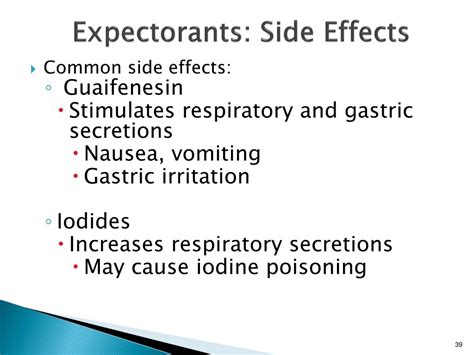Intro
Discover what is expectorant, a medication that thins mucus, making it easier to cough up, relieving congestion and coughs, and learn about its types, uses, and benefits in treating respiratory issues like bronchitis and asthma.
Expectorants are a type of medication that helps to thin and loosen mucus in the lungs, making it easier to cough up. This can be especially helpful for people who have respiratory conditions such as bronchitis, asthma, or chronic obstructive pulmonary disease (COPD). Expectorants work by increasing the amount of water in the mucus, making it less sticky and easier to expel from the body. This can help to relieve congestion and make breathing easier.
Expectorants are often used to treat coughs and colds, as well as other respiratory infections. They can be found in many over-the-counter (OTC) medications, such as cough syrups and tablets. Some expectorants are also available by prescription, and may be used to treat more severe respiratory conditions. In addition to their use in treating respiratory conditions, expectorants may also be used to help relieve symptoms of allergies, such as congestion and postnasal drip.
The use of expectorants is an important part of managing respiratory health, and can help to prevent complications such as pneumonia and bronchitis. By loosening and clearing mucus from the lungs, expectorants can help to reduce the risk of infection and promote healthy breathing. Overall, expectorants are a valuable tool in the treatment of respiratory conditions, and can provide significant relief from symptoms such as congestion and coughing.
How Expectorants Work

There are several different types of expectorants, including guaifenesin, acetylcysteine, and bromhexine. Each of these expectorants works in a slightly different way, but all share the common goal of loosening and clearing mucus from the lungs. Guaifenesin, for example, is a commonly used expectorant that works by increasing the amount of water in the mucus, making it less sticky and easier to expel. Acetylcysteine, on the other hand, works by breaking down mucin, a key component of mucus.
Types of Expectorants
There are several different types of expectorants, each with its own unique mechanism of action. Some of the most common types of expectorants include: * Guaifenesin: This is a commonly used expectorant that works by increasing the amount of water in the mucus, making it less sticky and easier to expel. * Acetylcysteine: This expectorant works by breaking down mucin, a key component of mucus. * Bromhexine: This expectorant works by increasing the production of surfactant, a substance that helps to reduce the surface tension of mucus, making it easier to expel. * Ambroxol: This expectorant works by increasing the production of surfactant and breaking down mucin.Benefits of Expectorants

Common Uses of Expectorants
Expectorants are commonly used to treat a variety of respiratory conditions, including: * Coughs and colds: Expectorants can help to relieve symptoms such as congestion and coughing. * Bronchitis: Expectorants can help to loosen and clear mucus from the lungs, making it easier to breathe and relieving symptoms such as congestion and coughing. * Asthma: Expectorants can help to reduce the amount of mucus in the lungs and make it easier to breathe. * COPD: Expectorants can help to loosen and clear mucus from the lungs, making it easier to breathe and relieving symptoms such as congestion and coughing.Side Effects of Expectorants

Precautions and Interactions
Expectorants can interact with other medications and have certain precautions, including: * Pregnancy and breastfeeding: Some expectorants, such as guaifenesin, are safe to use during pregnancy and breastfeeding, while others, such as acetylcysteine, may not be. * Children: Some expectorants, such as guaifenesin, are safe to use in children, while others, such as acetylcysteine, may not be. * Other medications: Expectorants can interact with other medications, such as blood thinners and diabetes medications, and may not be suitable for people with certain medical conditions, such as kidney or liver disease.Conclusion and Future Directions

We invite you to share your thoughts and experiences with expectorants in the comments below. Have you used an expectorant to treat a respiratory condition? What were your results? Do you have any questions about expectorants or their use? We would be happy to hear from you and provide any additional information or guidance you may need.
What is an expectorant?
+An expectorant is a type of medication that helps to thin and loosen mucus in the lungs, making it easier to cough up.
How do expectorants work?
+Expectorants work by increasing the amount of water in the mucus, making it less sticky and easier to expel from the body.
What are the benefits of expectorants?
+Expectorants offer several benefits, including relief from congestion and coughing, reduced risk of infection, and improved lung function.
